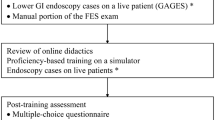Abstract
Background
The Fundamentals of Endoscopic Surgery (FES) manual skills examination is a simulation-based assessment of five foundational skills in endoscopic surgery. With the FES skills exam becoming part of the board certification process in general surgery, continual investigation is needed to determine the validity with which the exam is supporting inferences and decision-making about examinees, as well as how it might be improved.
Methods
The present study retrospectively analyzed performance and demographic details for the initial 344 examinees completing the FES skills exam.
Results
The five tasks showed distinct degrees of difficulty, with Loop Reduction being especially difficult for examinees. Tasks related to one another positively but moderately, suggesting that the exam assesses both general and task-specific skills. The number of lower-endoscopic cases completed by an examinee strongly predicted performance, while upper endoscopy experience and career level (e.g., resident vs. fellow vs. practicing) did not. Hand dominance and the type of simulator used were not found to be related to scores. However, three demographic variables that related to one another—gender, glove size, and height—were also related to performance and pass/fail status.
Conclusions
This study’s results generally support the validity argument for the FES skills exam while pointing to additional investigations to be undertaken as the exam is applied more broadly.



Similar content being viewed by others
References
Hazey JW, Marks JM, Mellinger JD, Trus TL, Chand B, Delaney CP, Dunkin BJ, Fanelli RD, Fried GM, Martinez JM, Pearl JP, Poulose BK, Sillin LF, Vassiliou MC, Melvin WS (2014) Why fundamentals of endoscopic surgery (FES)? Surg Endosc 28:701–703
Vassiliou MC, Dunkin BJ, Fried GM, Mellinger JD, Trus T, Kaneva P, Lyons C, Korndorffer JR Jr, Ujiki M, Velanovich V, Kochman ML, Tsuda S, Martinez J, Scott DJ, Korus G, Park A, Marks JM (2014) Fundamentals of endoscopic surgery: creation and validation of the hands-on test. Surg Endosc 28:704–711
Poulose BK, Vassiliou MC, Dunkin BJ, Mellinger JD, Fanelli RD, Martinez JM, Hazey JW, Sillin LF, Delaney CP, Velanovich V, Fried GM, Korndorffer JR Jr, Marks JM (2014) Fundamentals of Endoscopic Surgery cognitive examination: development and validity evidence. Surg Endosc 28:631–638
Mueller CL, Kaneva P, Fried GM, Feldman LS, Vassiliou MC (2014) Colonoscopy performance correlates with scores on the FES™ manual skills test. Surg Endosc 28(11):3081–3085
American Board of Surgery (2017) Flexible Endoscopy Curriculum for General Surgery Residents. Available at https://www.absurgery.org/default.jsp?certgsqe_fec Accessed 22 March 2017
American Board of Surgery (2017) ABS Establishes New Requirement for Endoscopic Training and Assessment. Available at https://www.absurgery.org/default.jsp?news_fec Accessed 22 March 2017
American Educational Research Association, American Psychological Association, National Council on Measurement in Education (2014) Standards for Educational and Psychological Testing. Washington, DC: AERA
APA Publications and Communications Board Working Group on Journal Article Reporting Standards (2008) Reporting standards for research in psychology: Why do we need them? What might they be? American Psychologist 63(9):839–851
Cheng A, Kessler D, Mackinnon R, Chang TP, Nadkarni VM, Hunt EA, Duval-Arnold J, Yiqun L, Cook DA, Pusic M, Hui J, Moher D, Egger M, Auerbach M (2016) Reporting guidelines for health care simulation research: extensions to the CONSORT and STROBE statements. Adv Simul 1:25
Mueller CL, Kaneva P, Fried GM, Mellinger JD, Marks JM, Dunkin BJ, van Sickle K, Vassiliou MC (2016) Validity evidence for a new portable, lower-cost platform for the fundamentals of endoscopic surgery skills test. Surg Endosc 30:1107–1112
Edwards JR, Bagozzi RP (2000) On the nature and direction of relationships between constructs and measures. Psychol Methods 5(2):155–174
Cortina JM (1993) What is coefficient alpha? An examination of theory and applications. J Appl Psychol 78:98–104
Cronbach LJ, Shavelson RJ (2004) My current thoughts on coefficient alpha and successor procedures. Educ Psychol Measur 64(3):391–418
Green SB, Yang Y (2009) Commentary on coefficient alpha: a cautionary tale. Psychometrika 74:121–135
Schmitt N (1996) Uses and abuses of coefficient alpha. Psychol Assess 8:350–353
Sijtsma K (2009) On the use, the misuse, and the very limited usefulness of Cronbach’s alpha. Psychometrika 74(1):107
Yudkowsky R, Park YS, Lineberry M, Knox A, Ritter EM (2015) Setting mastery learning standards. Acad Med 90(11):1495–1500
Cook DA (2014) Much ado about differences: why expert-novice comparisons add little to the validity argument. Adv Health Sci Educ 27:1–6
Society for Industrial & Organizational Psychology (2003) Principles for the validation and use of personnel selection procedures, 4th edn. SIOP, Bowling Green
Campbell SM, Collaer ML (2009) Stereotype threat and gender differences in performance on a novel visuospatial task. Psychol Women Q 33(4):437–444
Kass SJ, Ahlers RH, Dugger M (1998) Eliminating gender differences through practice in an applied visual spatial task. Human Perform 11(4):337–349
Ali A, Subhi Y, Ringsted C, Konge L (2015) Gender differences in the acquisition of surgical skills: a systematic review. Surg Endosc 29(11):3065–3073
Adams DM, Fenton SJ, Schirmer BD, Mahvi DM, Horvath K, Nichol P (2008) One size does not fit all: current disposable laparoscopic devices do not fit the needs of female laparoscopic surgeons. Surg Endosc 22(10):2310–2313
Cook DA, Zendejas B, Hamstra SJ, Hatala R, Brydges R (2014) What counts as validity evidence? Examples and prevalence in a systematic review of simulation-based assessment. Adv Health Sci Educ 19(2):233–250
Cook DA, Lineberry M (2016) Consequences validity evidence: evaluating the impact of educational assessments. Acad Med 91(6):785–795
Tolsgaard MG, Ringsted C (2014) Using equivalence designs to improve methodological rigor in medical education trials. Med Educ 48(2):220–221
Cook DA, Hatala R (2016) Validation of educational assessments: a primer for simulation and beyond. Adv Simul 1(1):31
Acknowledgments
We would like to gratefully acknowledge Jessica Mischna, Sarah Colon, and Robyann Jumaoas from the SAGES FES Program for their help in providing the de-identified data.
Author information
Authors and Affiliations
Corresponding author
Ethics declarations
Disclosures
Drs. Lineberry and Ritter have no conflicts of interest or financial ties to disclose.
Rights and permissions
About this article
Cite this article
Lineberry, M., Matthew Ritter, E. Psychometric properties of the Fundamentals of Endoscopic Surgery (FES) skills examination. Surg Endosc 31, 5219–5227 (2017). https://doi.org/10.1007/s00464-017-5590-1
Received:
Accepted:
Published:
Issue Date:
DOI: https://doi.org/10.1007/s00464-017-5590-1




